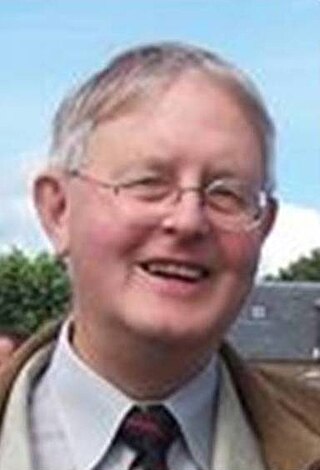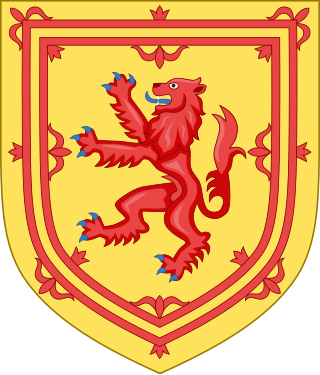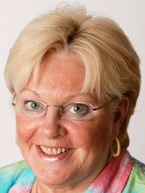
The Scottish Labour Party (SLP) was a socialist party in Scotland that was active between 1976 and 1981. It formed as a breakaway from the UK Labour Party. It won three council seats in 1977 but lost its MPs at the 1979 election and was dissolved two years later.
Margaret Anne Ewing was a Scottish politician and journalist. She served as a Scottish National Party (SNP) Member of Parliament for East Dunbartonshire from 1974 to 1979 and Moray from 1987 to 2001, and was the Member of the Scottish Parliament (MSP) for Moray from 1999 until 2006.
William Cuthbertson Wolfe was a Scottish accountant, manufacturer and Scottish National Party (SNP) politician. He was the National Convenor (leader) of the SNP from 1969 to 1979, playing a central role in the transformation of the SNP into a modern, progressive political movement, and in the development of the SNP's social democratic political philosophy.

Arthur William Donaldson was a Scottish journalist and Scottish National Party (SNP) politician. He was leader of the Scottish National Party from 1960 to 1969.
Donald James Stewart was Scottish National Party (SNP) Member of Parliament (MP) from 1970 to 1987 for the Western Isles. He also served as President of the Scottish National Party (SNP) from 1982 to 1987. He was a councillor in Stornoway for many years and twice served as the town's provost.
John McAllion is a campaigner for the Scottish Socialist Party, as well as a former Labour Party Member of Parliament (MP), Member of the Scottish Parliament (MSP), and convenor of Tayside Regional Council. He is also convener of the Scottish Fairtrade Forum.
Douglas Henderson was a Scottish politician. He was Depute Leader of the Scottish National Party (SNP) from 1971 to 1973 and from 1979 to 1981. He served as a Scottish National Party Member of Parliament (MP) for East Aberdeenshire from 1974 to 1979, and held virtually every national office in the SNP, short of party leader. His political style has been described as "no-nonsense" and "very blunt and forthright". He was also known for his forceful public speaking, which former SNP leader Alex Salmond described as "messianic".

Robert Gordon Wilson was a Scottish politician and solicitor. He was the leader of the Scottish National Party (SNP) from 1979 to 1990, and was SNP Member of Parliament (MP) for Dundee East from 1974 to 1987. He was Rector of the University of Dundee from 1983 to 1986.
Charles Douglas Drysdale was a Scottish nationalist activist and businessman.
In Scotland, the Scottish National Party (SNP) is a left social democratic political party which campaigns for Scottish independence. The SNP has controlled Scotland's devolved legislature since the 2007 election as a minority government, and were a majority government from the 2011 election and have been a minority government, since the 2016 election.

The Glasgow Central by-election, in the Glasgow Central constituency, was held on 15 June 1989. It was caused by the death of the sitting Member of Parliament, Bob McTaggart.

The 1980 Glasgow Central by-election was a by-election held on 26 June 1980 for the British House of Commons constituency of Glasgow Central, following the death of its sitting MP, Thomas McMillan.
George Machin was a British Labour Party politician, engineering inspector and shop steward.

The Glasgow Govan by-election was held on 8 November 1973, following the death of John Rankin, Labour Party Member of Parliament for the Glasgow Govan constituency. Rankin had died one month earlier, on 8 October 1973. Rankin had held the seat since 1955. With the exception of a narrow Conservative victory in 1950, the seat had been solidly Labour-held since 1918. For the by-election the Labour Party nominated Harry Selby, a veteran activist in Glasgow and a former Trotskyist. It was later reported that Selby's selection had been controversial with some Labour members who felt that at the age of 61 he was too old to be starting a parliamentary career.
There was a by-election for Dundee East, in Scotland, on 1 March 1973. It was one of three UK parliamentary by-elections held on that day. It was caused by the appointment of George Thomson as a European commissioner. George Machin retained the seat for Labour, but only narrowly. There was a strong showing by the Scottish National Party, which prefigured their serious breakthrough at the Govan by-election later in the year, and the two general elections of 1974.
A by-election for the House of Commons of the UK Parliament took place in Edinburgh North on 8 November 1973. Alexander Fletcher retained the seat for the Conservatives, after his predecessor became Duke of Buccleuch.
Ian C. H. Macdonald is a former Scottish nationalist activist.
Elections for the City of Glasgow District Council took place on 3 May 1977, alongside elections to the councils of Scotland's various other districts. These were the second elections to the City of Glasgow District Council, and saw Labour losing their control of the council, losing nearly half of their councillors. Among the losing councillors was Dick Dynes, the Labour group leader. Dynes was replaced as leader by Jean McFadden.
There was an election to choose a new leader of the Scottish National Party (SNP) held in 1979. The election saw Gordon Wilson become the party's new national convenor.

A general election was held in the United Kingdom on Thursday 3 May 1979 and all 71 seats in Scotland were contested.







